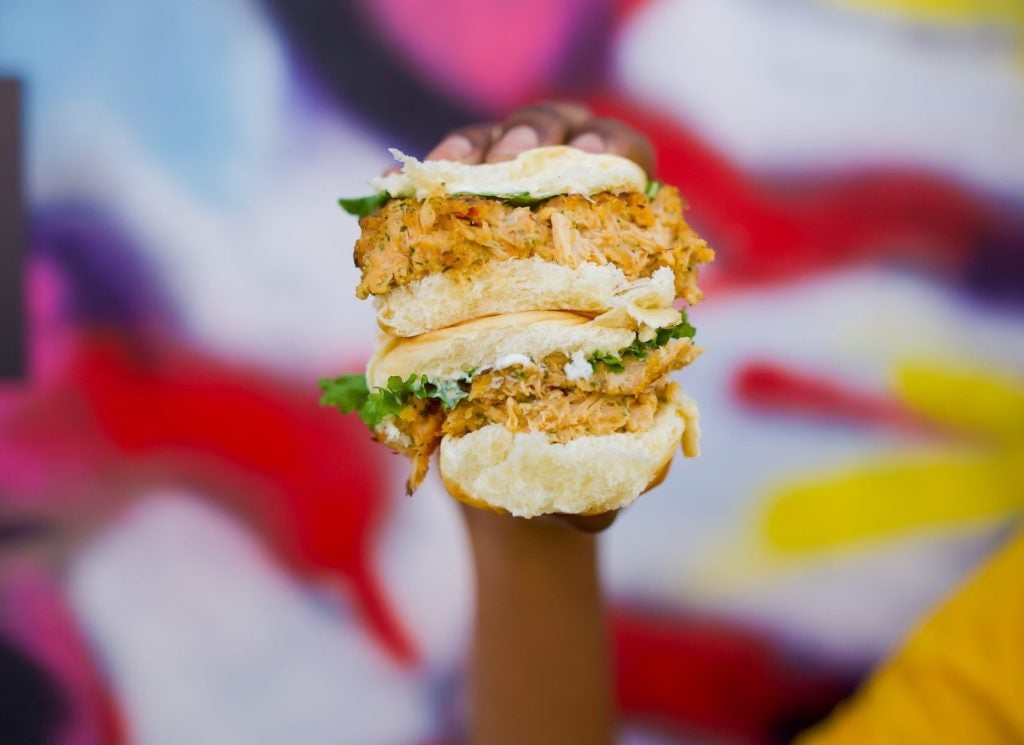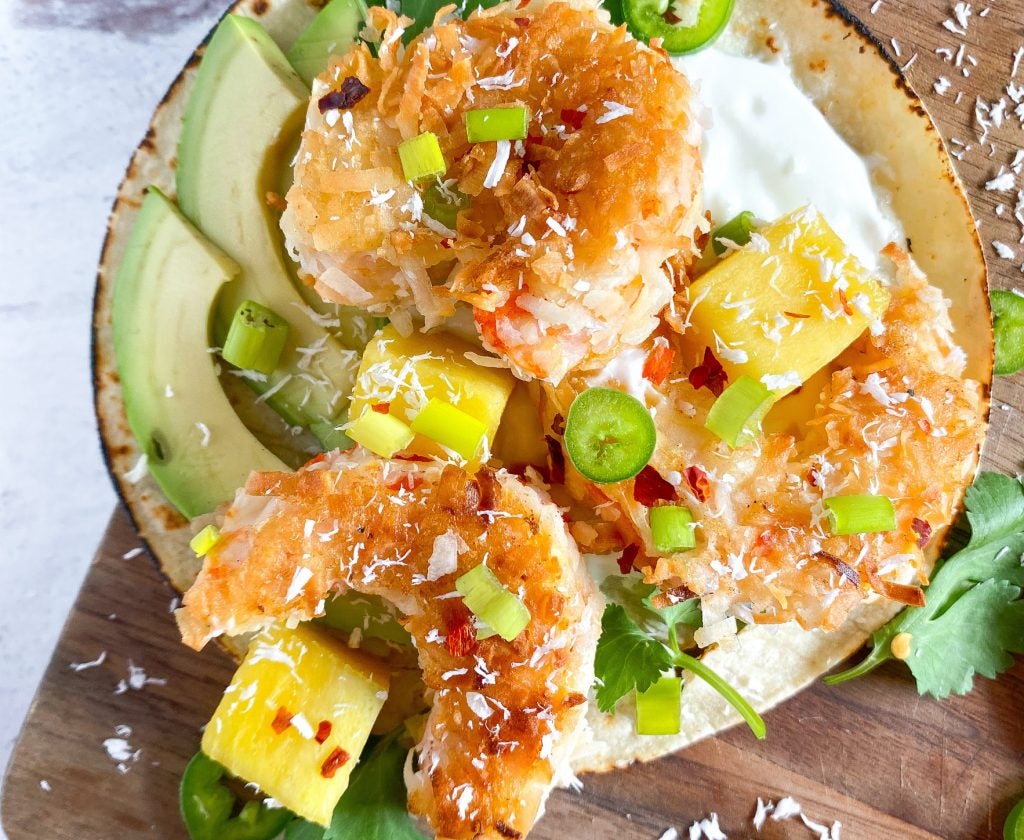
Just Food: What is your overall impression of the market for plant-based seafood in the US?
The Plant Based Seafood Co. co-founder and CEO Monica Talbert: No doubt, plant-based seafood is still in its infancy. It has a bit more challenges than meat and chicken. If I’m being honest, chicken nuggets aren’t too terribly hard to replicate. It’s one kind of texture. It’s very similar with meat analogues as well. Seafood is a bit different because each sea creature is so different. A shrimp texture and the muscle fibre is completely different from a scallop and sometimes takes different ingredients, novel ingredients, manufacturing and processing differences. It’s a harder nut to crack, getting the taste and texture down.
But I do think it’s definitely primed for growth. In general, a lot of consumers are just looking for more meat-free options, they’re looking for more plant-based. Plant-based seafood needs to be in more use cases, it needs to be more accessible and there needs to be more awareness … but I think it’s still in its infancy and getting taste and texture right has been a challenge.
JF: What can be done there?
MT: It’s just more R&D. It’s more iterations of products. We’re close and we’re on the cusp. We have some of the best products in the market. And, I will say that the last year, if there was any stunt to growth, the supply chain was pretty terrible. There’s been a lot of talk about the plant-based industry, the sales are down and things like that, but I don’t think what people are taking into account is you have these smaller start-ups that are really pushing plant-based alternatives and were hit bad with supply chain and inflation. You’ve got to bring that into the conversation when you talk about the future of plant-based and really going over the numbers and the growth percentage.
JF: When you look at consumer feedback, what are shoppers in the US saying about the taste and texture of plant-based seafood?
MT: Outside of our product [laughs], I think that there still needs to be work done. Like I said, it’s very hard to get a one-for-one replication and I don’t think that this industry is going to see its potential until that happens. But also you have to remember, three years ago, Covid hit, you’re coming up with these new, novel, wonderful products and, well, you can’t launch them into foodservice where chefs would take them over and create the use case and the wonderful presentation. They would be offered on a menu and you’re out with your friends and it’s ’Let’s try this. It’s interesting.’ Everything was shut down. We were reliant on direct-to-consumer, which means that we had to educate the consumer on what was going on, tell them why it was so wonderful, tell them why they should try it and then also meet them at the grocery store where they hadn’t come by plant-based seafood that much. They weren’t aware of it quite yet.
So now we’re just getting into the foodservice channel. We have an investor partner, Tom Colicchio, who is a top chef, eight times James Beard-nominated, world-renowned chef. He’s known for seafood and meat. Him getting into plant-based seafood is huge because that’s telling consumers that they can trust this product with their taste buds. Putting it on his menu, getting other chefs to put it on their menus, this is how you increase the use cases, you increase the awareness and this is what hasn’t happened yet for plant-based seafood.
JF: It’s been said to me it’s just easier to make a plant-based burger, a plant-based sausage.
MT: One thousand per cent. And people are very particular about their seafood. It’s a cultural experience for many people, at least in the United States. They feel a certain kind of way about their seafood and that puts even more pressure on getting the taste, the texture, the appearance.
There’s a lot of raw tuna or raw shichimi that’s coming to the market. I think consumers aren’t ready for that quite yet. Because if you think about it, at least in the United States, consumers have trouble going into the supermarket and buying raw tuna and raw salmon and taking it home and preparing it. They’re not used to that. Where do they eat that? They eat that out at the restaurant. That’s where we need to meet consumers. That’s where the gap is and where the opportunity is.

JF: When you go into the average mass grocery store in the US at the moment, what does the fixture look like?
MT: I would say at the mass supermarkets there are not a lot of options but you have the Sprouts and the Whole Foods and that’s where you’ll find it. But, honestly, that’s where it needs to be because that’s where the consumer base is. Those are the people that are looking for plant-based options [and] are willing to try it out. That’s where we need to build the customer base first before going into the general mass consumer market.
JF: Has the market taken shape the way you thought it might? Has it been slower?
MT: It hasn’t been slower. If there’s been any kind of chokehold on our products, it’s just from the supply chain. The demand is there, especially from the natural – or Wegmans or Sprouts – buyers. They’re contacting me and they’re looking for these products because they know their consumers are looking for these products.
JF: Specifically for The Plant Based Seafood Co., what have been the major issues in the supply chain?
MT: It’s all of it. It’s even down to the retail boxes that you used to be able to get in two, three weeks; now they’re on a ten-week lead time that [can] get lost on a truck for two weeks.
JF: It must be difficult for a budding business looking to get into a market.
MT: For sure and so many in the plant-based space, not just seafood, are smaller start-ups. You have a few larger players and we’re all struggling with this. It’s all CPG. It’s all food. It’s not just plant-based but I think we have to talk about that and address that when we’re looking at numbers and people are people are ‘Oh, it’s cooling off’ or they’re looking at Beyond Meat or Oatly and their valuations aren’t there. You have to talk about what’s going on.
JF: According to some estimates, plant-based seafood is worth 0.1% of the conventional seafood market in the US.
MT: Right now but it’s definitely growing. We have a lot to do to get seafood eaters. I talk about this all the time. Vegans are great and people that are maybe looking at themselves as plant-based are great as our base consumer but we’re after the seafood eaters and that’s a different animal, no pun intended.
Our strategy is you can’t just sit on the shelf. You’ve also got to be in the prepared food section, you’ve got to be in other use cases for the consumer. I think for people that love plant-based, or try to decrease the amount of meat that they’re eating, it gets old, right? Your options get old, so plant-based seafood just gives you another delicious meat-free experience. But you have to give that to the consumer. You can’t give them a raw piece of tuna and say ‘Here’s your plant-based seafood experience.’

Our first product that we launched was a crunchy coconut shrimp. It wasn’t raw shrimp. I had so many investors come up to me and [say] ‘Oh, why don’t you come up with the raw shrimp? The opportunity is there.’ The opportunity is there but the consumer is not there yet and the last thing I want to do – which is what’s happening – is create these products and put them on a shelf and then they sit and then they get discontinued. You have to understand the market, the consumer and build your go-to-market strategy around that. The crunchy coconut shrimp, the breaded shrimp, the dusted scallops, or the crab cake that we just came out with, these are experiences that we’re offering. We’re not just offering plant-based seafood. We’re offering seafood experiences.
JF: What does the price differential between plant-based and conventional seafood look like? As the category grows and companies scale, can that come down?
MT: So, seafood is really hard to replicate, which means that the manufacturing process is a bit complicated, which means that the ingredients are a bit more novel. That means that the cost to produce higher – but you have to get that first and then you have to bring in efficiencies of production and scale. Once that happens, you’ve got to bring the price down. Then you also at the same time have to bring in a convenience factor. Those three things I think are the trifecta that really push the market forward. But see where we are right now. We’re still in the getting the replication right [stage].
JF: Has there been any feedback from consumers where they say they are reluctant to try plant-based seafood products because they feel they are over-processed?
MT: It’s a huge conversation but, yes, the number one reason consumers are moving towards a plant-based diet is because of health reasons. So, if they’re looking at your product as not as healthy as the meat counterpart, then you’re not doing the industry justice. I think that that’s the issue with what’s currently going on and that’s why we don’t use soy in their product. I think soy is a big one that consumers want to stay away from. It’s a complicated ingredient right there. Some people say it’s nutritious and sustainable, or [some say] it’s genetically modified, it’s ruining the rainforest, it’s not good in the body.
JF: Does The Plant Based Seafood Co. give out any sales or profit numbers?
MT: Typically, we don’t.
JF: Is The Plant Based Seafood Co.’s revenue mainly from retail? Are you looking to grow sales from foodservice?
MT: Big-time foodservice splash. We went to the National Restaurant Association show back in May or June and we’ve got some really exciting partnerships with some of the largest US broadline food distributors and looking to really expand.
JF: When do you think you could launch into a new geography beyond the US? Have you got a date in mind?
MT: Yes, so it’ll most likely be with [the scallop] product because shelf stable’s much better for shipping. I would say Q1.
JF: I’m assuming more financial support and more investor appetite is needed to support companies like The Plant Based Seafood Co. to really grow this, for it to become a fully-fledged category.
MT: Investment, sure, capital. I think international partnerships are key. We’re getting there. You have to remember, we’re only two years old. Plant-based seafood is so brand new. The future’s definitely bright for plant-based seafood, especially on a global scale for sure but you have to give us time to get there.
